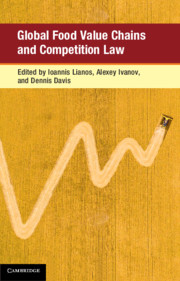Book contents
- Global Food Value Chains and Competition Law
- Global Competition Law and Economics Policy
- Global Food Value Chains and Competition Law
- Copyright page
- Contents
- List of Authors
- 1 Global Food Value Chains
- 2 Rents, Power and Governance in Global Value Chains
- 3 The Financialization of Land and Agriculture
- 4 Agriculture, End to End
- 5 New Forms of Financing the Agricultural Sector in Brazil
- 6 Economic Concentration and the Food Value Chain
- 7 The State of American Competition Law with Respect to the Food Chain
- 8 The Brazilian Food Value Chain and Competition Policy
- 9 Competition Concerns in Fertilizer Import-Dependent Countries like India and China
- 10 Russian Competition Policy Over Value Chains in Agricultural and Food Sectors
- 11 The Pioneer/Pannar Merger, the Maize Seed Value Chain and Globalisation
- 12 Power in the Food Value Chain
- 13 Efficiency and Fairness
- 14 China’s Legal Regulation of the Abuse of Market Power by Large Retailers
- 15 Superior Bargaining Power in Russian Contract and Competition Law
- 16 Regulating Unfair Trading Practices in the EU Food Supply Chain
- 17 Food Chain Certification and the Social Pluralism of Competition Law
- 18 Hunger Games
- 19 Agribiotech Patents in the Food Supply Chain
- 20 Mergers and Product Innovation
- 21 The Global Grain Trade
- Index
15 - Superior Bargaining Power in Russian Contract and Competition Law
Published online by Cambridge University Press: 12 May 2022
- Global Food Value Chains and Competition Law
- Global Competition Law and Economics Policy
- Global Food Value Chains and Competition Law
- Copyright page
- Contents
- List of Authors
- 1 Global Food Value Chains
- 2 Rents, Power and Governance in Global Value Chains
- 3 The Financialization of Land and Agriculture
- 4 Agriculture, End to End
- 5 New Forms of Financing the Agricultural Sector in Brazil
- 6 Economic Concentration and the Food Value Chain
- 7 The State of American Competition Law with Respect to the Food Chain
- 8 The Brazilian Food Value Chain and Competition Policy
- 9 Competition Concerns in Fertilizer Import-Dependent Countries like India and China
- 10 Russian Competition Policy Over Value Chains in Agricultural and Food Sectors
- 11 The Pioneer/Pannar Merger, the Maize Seed Value Chain and Globalisation
- 12 Power in the Food Value Chain
- 13 Efficiency and Fairness
- 14 China’s Legal Regulation of the Abuse of Market Power by Large Retailers
- 15 Superior Bargaining Power in Russian Contract and Competition Law
- 16 Regulating Unfair Trading Practices in the EU Food Supply Chain
- 17 Food Chain Certification and the Social Pluralism of Competition Law
- 18 Hunger Games
- 19 Agribiotech Patents in the Food Supply Chain
- 20 Mergers and Product Innovation
- 21 The Global Grain Trade
- Index
Summary
Chapter 15 provides a glimpse of alternative approaches to deal with supermarket power, outside the competition law toolbox, by exploring the various Russian law instruments designed to protect the weaker party to a contractual agreement, which is subject to the principles of Russian law. The authors argue that both Russian law and Russian judicial practice dispose of all the necessary instruments to help contracting parties achieve economic justice in specific cases. The authors describe the genesis and further development of Russian legislation, judicial practice and legal policy regarding the protection of the weaker party, through a comparative law perspective. In particular, the authors describe the impact of the concept of ‘superior bargaining power’ in both contract law and competition law in Russia. They argue that this traditional civil-law concept may narrow down antitrust enforcement and make it more balanced and fair from the perspective of market actors. By fostering the expansion of the superior bargaining power concept, the authors contend that it will mitigate the problems that arise out of the complexity and excessive formality of the traditional antitrust enforcement criteria applied in Russia.
Keywords
- Type
- Chapter
- Information
- Global Food Value Chains and Competition Law , pp. 348 - 372Publisher: Cambridge University PressPrint publication year: 2022

